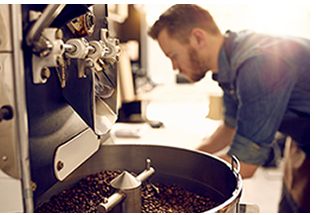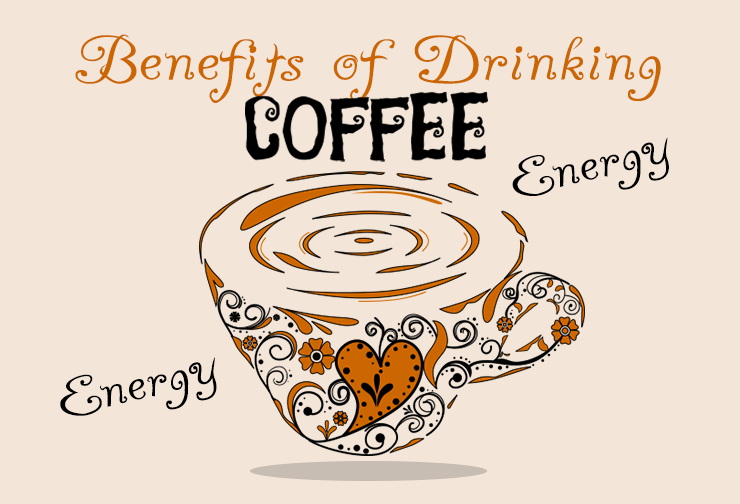1. Improves circulation Drinking a five-ounce cup of coffee is proven to cause a 30% boost in capillary blood flow according to a Japanese study. This level of increased blood circulation results in better oxygenation of your body’s tissues which has a number of benefits, such as improved performance in physical activities. https://newsarchive.heart.org/coffee-may-help-perk-up-your-blood-vessels/ 2. Is pain-reducing Research from the University of Illinois determined that 2-3 cups of coffee can decrease participants’ perceived level of pain, in this case following a workout. These findings were repeated in a University of Georgia study where participants reported 48% decrease in muscle soreness, vs. 30% and 25% with naproxen and aspirin, respectively. https://www.jpain.org/article/S1526-5900(06)01023-6/abstract 3. Improves endurance Not only can coffee decrease your perceived level of pain during physical exertion, it can also decrease your perceived level of exertion. By reducing the amount of energy you feel, you’re expending (by more than 5%), and your exercise actually feels easier. As a result, drinking coffee before working out can improve exercise performance by more than 11%, since you feel like you’re exerting less energy. https://www.ncbi.nlm.nih.gov/pubmed/15773860 4. Helps preserve muscle tissue When you drink coffee, your brain releases a substance called Brain-Derived Neurotrophic Factor (BDNF), which supports the powerhouse of your muscles. Without this essential factor, muscles are more likely to experience atrophy. Essentially, the caffeine in coffee helps stave off age-related strength loss which can also reduce your risk of injuries. https://www.ncbi.nlm.nih.gov/pmc/articles/PMC5697621/ 5. Helps cognitive function Caffeine in coffee induces feelings of alertness and increased energy as a result of its interactions with adenosine receptors in the brain. This causes an improvement in various areas of brain function such as reaction times, vigilance and general cognitive function. It’s the reason many people turn to their morning cup of coffee. Coffee can give you that extra boost you need when you’ve had insufficient sleep. This is due to the caffeine which acts as a stimulant that helps you feel more alert and focused. It gives you a boost in energy and helps you keep going when you’re low on stamina. https://www.ncbi.nlm.nih.gov/pubmed/18625110 https://www.ncbi.nlm.nih.gov/pubmed/8232842 https://link.springer.com/article/10.1007/s002130000383 6. Raises energy levels Coffee contains stimulants. Many biologically active substances found in coffee beans find their way into the final drink. Several of them can affect your metabolism: Caffeine: The main stimulant in coffee, caffeine, is very potent and works by blocking an inhibitory neurotransmitter called adenosine. By blocking adenosine, caffeine increases the firing of neurons and release of neurotransmitters like dopamine and norepinephrine. This, in turn, makes you feel more energized and awake. In this way, coffee helps you stay active when you would otherwise feel tired and may improve exercise performance by 11–12%, on average. Caffeine stimulates the nervous system, sending direct signals to the fat cells to be used for energy rather than remain in storage. It does this by increasing blood levels of the hormone epinephrine. Epinephrine, also known as adrenaline, travels through your blood to the fat tissues, signaling them to break down fats and release them into your blood. https://link.springer.com/article/10.1007%2Fs10068-010-0151-6 https://www.ncbi.nlm.nih.gov/pubmed/11815511 https://www.ncbi.nlm.nih.gov/pubmed/8201901 https://www.ncbi.nlm.nih.gov/pmc/articles/PMC4115368/ https://www.ncbi.nlm.nih.gov/pubmed/20164566 https://onlinelibrary.wiley.com/doi/abs/10.1111/j.1600-0838.2005.00445.x https://www.ncbi.nlm.nih.gov/pubmed/15657469/ Theobromine: The main stimulant in cocoa; also found in smaller amounts in coffee. https://www.ncbi.nlm.nih.gov/pubmed/25750625 Theophylline: Another stimulant found in both cocoa and coffee; has been used to treat asthma. https://www.ncbi.nlm.nih.gov/pubmed/23672674 Chlorogenic acid: One of the active compounds in coffee; may help slow the absorption of carbs. In one Spanish study, athletes who drank the equivalent of 12 ounces of coffee before working out burned roughly 15% more calories than normal, for as much as three hours after exercising. Even if you don’t work out, 23 drinking one to two cups per day of coffee has been proven to boost your metabolism by 10 to 20%. https://www.ncbi.nlm.nih.gov/pubmed/1932494 https://www.ncbi.nlm.nih.gov/pubmed/24901809 7. Helps burn fat Releasing fatty acids into your blood does not help you lose fat unless you are burning more calories than you consume through your diet. This condition is known as a negative energy balance. You can reach a negative energy balance by either eating less or exercising more. Another complementary strategy is to take fat-burning supplements such as caffeine. Caffeine is found in almost every commercial fat-burning supplement — and for good reason. It’s one of the few natural substances proven to aid fat burning. Several studies show that caffeine can boost your metabolic rate by 3–11%. https://www.ncbi.nlm.nih.gov/pubmed/2912010 https://www.ncbi.nlm.nih.gov/pubmed/7486839 8. Improves memory Another important brain function supported by coffee consumption is enhanced memory. Drinking two eight-ounce cups of coffee per day has been proven to improve long-term memory. https://www.ncbi.nlm.nih.gov/pmc/articles/PMC5909971/ https://www.ncbi.nlm.nih.gov/pubmed/18625110 http://www.townsendletter.com/Jan2005/nutinflu0105.htm 9. Lowers risk of depression In a Harvard study published in 2011 coffee has also been linked to a lower rate of depression, especially in women. Those who consume as many as four eight-ounce cups per day were found to lower their depression risk by as much as 20%. This lowered risk is due to the fact that coffee also has an impact on the production of brain chemicals such as serotonin and dopamine. Another study in 208,424 individuals found that those who drank 4 or more cups per day were 53% less likely to die by suicide. Make you feel happier. Being happy is healthy, right? And for those who love coffee, there’s nothing better than that familiar warmth and taste that gets you going each morning, or any time of the day. https://www.ncbi.nlm.nih.gov/pmc/articles/PMC6163886/ https://www.ncbi.nlm.nih.gov/pubmed/26339067 https://www.psychologytoday.com/intl/blog/the-superhuman-mind/201709/how-does-coffee-help-alleviate-depression https://jamanetwork.com/journals/jamainternalmedicine/fullarticle/1105943 https://www.ncbi.nlm.nih.gov/pubmed/21949167 https://www.ncbi.nlm.nih.gov/pubmed/8604958 10. Reduces risk for some cancers Coffee has been linked to a lowered risk for both liver and colorectal cancer, the world’s third and fourth most common cancers. Coffee drinkers appear to be at a 40% lower risk for liver cancer and 15% lower risk of colorectal cancer if they drink four to five cups per day. Links have also been found between coffee drinkers and a lower risk of basal cell carcinoma, a type of skin cancer. https://bmjopen.bmj.com/content/7/5/e013739 https://www.ncbi.nlm.nih.gov/pmc/articles/PMC4874555/ https://www.ncbi.nlm.nih.gov/pmc/articles/PMC4059399/ https://www.sciencedirect.com/science/article/pii/S0016508507005689 https://onlinelibrary.wiley.com/doi/full/10.1002/ijc.20989 https://www.ncbi.nlm.nih.gov/pubmed/22695871 11. Reduces risk for heart disease Studies over the years have claimed that consuming caffeine can increase blood pressure. While this is true, the effect is quite small and




